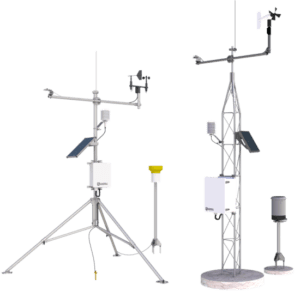A weather station is a facility, either on land or sea, with instruments and equipment for measuring atmospheric conditions to provide information for weather forecasts and to study the weather and climate. The measurements taken include temperature, atmospheric pressure, humidity, wind speed, wind direction, solar radiation and precipitation amounts. Wind measurements are taken with as few other obstructions as possible, while temperature and humidity measurements are kept free from direct solar radiation, or insolation. Manual observations are taken at least once daily, while automated measurements are taken at least once an hour.

Typical weather stations have the following instruments:
- Thermometer for measuring air and sea surface temperature
- Barometer for measuring atmospheric pressure
- Hygrometer for measuring humidity
- Anemometer for measuring wind speed
- Pyranometer for measuring solar radiation
- Rain gauge for measuring liquid precipitation over a set period of time.
- Present Weather/Precipitation Identification Sensor for identifying falling precipitation
- Transmissometer for measuring visibility
- Ceilometer for measuring cloud ceiling
More sophisticated stations may also measure the ultraviolet index, leaf wetness, soil moisture, soil temperature, water temperature in ponds, lakes, creeks, or rivers, and occasionally other data.
Automatic Weather Station(AWS) Mounting Arrangements

